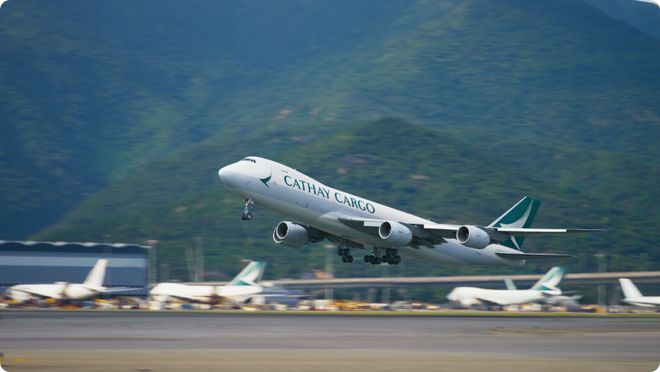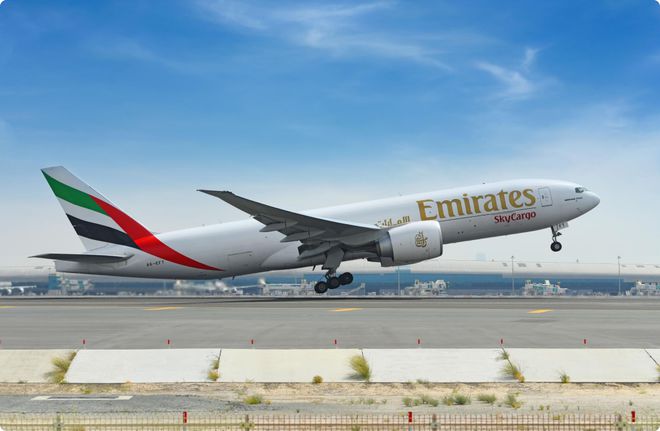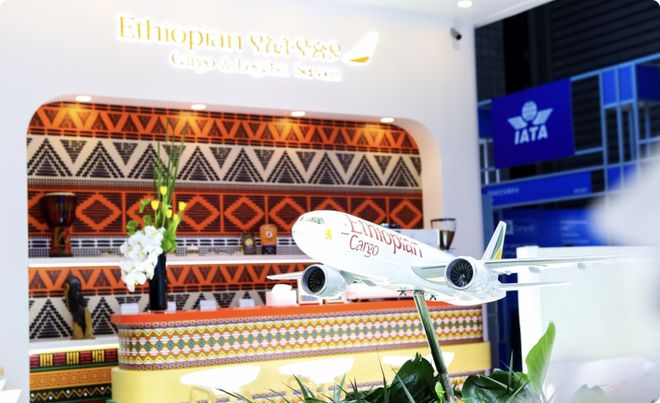Volume and price rise!
Air cargo market is booming this year
Recently, the International Air Transport Association (IATA, referred to as "International Air Transport Association") released the May global air cargo market regular data show that global freight demand continues to maintain strong growth. In terms of freight tonnage-kilometers increased by 14.7% year-on-year (international demand increased by 15.5%), achieving double-digit year-on-year growth for six consecutive months. Air cargo capacity (available freight tonnage kilometers) increased by 6.7% year-on-year (international capacity increased by 10.2%).
Iata director General Willie Walsh said demand for air cargo rose sharply across all regions in May, helped by increased trade, booming e-commerce and maritime capacity constraints. The outlook for air cargo remains generally positive as purchasing managers expect continued growth in demand going forward.
The crisis in the Red Sea helped boost air transport
Off-season is not light, peak season or will be more prosperous
After the end of the epidemic, the air transport market returned to normal, and this year ushered in new opportunities.
"Last year, Emirates' cargo volumes across 20 countries in the Asia-Pacific region grew by 15 per cent year on year, and demand for air cargo in Southeast Asia is growing strongly this year." Recently, Jeffrey Van Haeften, senior vice president of global cargo business of SkyCargo Cargo Department of Emirates Airlines, said in an interview with media groups, including the Paper news, that during the epidemic period (2020-2021 fiscal year), the overall contribution of cargo business to the company has increased to about 60%. The 2023-2024 fiscal year has returned to the normal share of 11%. However, with the increase in cargo volume and freight rates this year, the current proportion of cargo operations has increased again, reaching 13% to 14%.

"We are very confident about the overall development of the air freight industry this year." At the same time, the freight volume in May to June this year shows the situation of "off-season is not weak", and this growth momentum is expected to continue the trend, the second half of the traditional air transport season will be more prosperous.
For the reasons for the off-season is not light, He Ying analysis said that the fastest growing category of domestic freight is e-commerce, last year with the rise of domestic e-commerce platforms, the volume of goods shipped to the European and American markets is growing rapidly. At the same time, the demand for non-e-commerce goods such as electric vehicles, precision instruments and parts is also quite large and continues to increase steadily. In addition, it can be clearly seen that as domestic medical enterprises actively go to sea, from the previous simple import from Europe to the medical goods made in China to send abroad, the transport volume of medical goods has also increased.

In the context of the overall rising demand for air transport, a number of air freight executives mentioned to surging news reporters that since last year, shipping prices have been soaring under the Red Sea crisis, and under the background of short supply of shipping capacity, the demand for shipping to air transport has gradually emerged.
The Suez Canal-Red Sea, the international shipping artery, is the throat of Asia to the Mediterranean Sea and Europe. Since the outbreak of the new round of Israeli-Palestinian conflict on October 7 last year, the Houthi armed forces have continuously attacked ships in the Red Sea waters. In order to avoid risks, a number of international shipping companies have made decisions to suspend or detour. The instability of the shipping supply chain has promoted the container freight rate to rise sharply this year, and the contradiction between the lack of space and the lack of containers is prominent.
"If there is a 1 to 2 per cent fluctuation in sea freight, there is a 20 per cent increase in air freight. Fluctuations in sea freight demand have a huge impact on air freight." Jeffrey pointed out to the Surging news reporter that the Red Sea crisis has led to a shortage of shipping capacity, which has seen some emergency cargo turn to air freight, but the demand is mainly from the South Asian market. He Ying also told surging news reporters that this shift in demand is a slow process, which has brought great impact on the global supply chain of goods, and it seems that it will not end in the short term.
"In response to the current challenges posed by global supply chain disruptions, air cargo demand is also surging and many companies are turning to air cargo. There is significant growth in air cargo, particularly on trade routes from Asia to Europe." Ethiopian Airlines Group chief cargo officer Abel ALEMU YIMER told surging news reporters.

According to the periodic data of the global air cargo market released by the International Air Transport Association in May, the demand for air cargo by Asia-Pacific airlines increased by 17.8% year-on-year in May, the highest growth rate among all regions, and the capacity increased by 8.4% year-on-year. Among them, the Europe-Asia, Inland Asia and Middle East-Asia trade routes increased by 20.4%, 19.2% and 18.6%, respectively. Middle Eastern airlines saw a 15.3 per cent year-on-year increase in air cargo demand and a 2.7 per cent increase in capacity in May. Among them, the Middle East-Europe market performed particularly well, growing by 33.8% year-on-year.
In addition to the surge in cargo volumes, air freight prices are also on the rise.
"The impact of the Red Sea crisis on air freight prices is likely to be more limited in scope and duration." Immel pointed out that Ethiopian Airlines will adjust the price system according to changes in market demand, this year's price is slightly higher than last year, and in the future, it will be flexible to adjust according to the overall market.
He Ying told surging news reporters that compared with last year, the price of air freight has risen by at least 20%, but due to the different time of signing the contract, different routes have different increases.
"In the short term, domestic air freight prices will still rise." Jeffrey told Thepaper.cn that airlines transferred a large part of their capacity to China last year, and the new capacity in China this year will not increase significantly, and the supply will be relatively tight. Moreover, inflation has pushed up costs over the past two years. Under the surge of demand, the imbalance rate of cargo aircraft return is becoming more and more significant, and the increase of cargo aircraft empty load rate also causes the increase of freight cost.
Talking about the current supply chain instability in response to measures, He Ying said that Cathay Pacific will maintain agility and flexibility, on the one hand, fully consider diversity in route layout. For example, cargo aircraft are currently operating at 100% capacity. At the same time, the capacity of about five flights per year will be retained to increase the number of freighters during the peak season in the second half of the year. In addition, Cathay Pacific also has a large number of passenger aircraft belly capacity can be flexibly deployed.
Domestic and foreign air cargo increases the domestic market
The shortage of large wide-body machines needs to be solved
"With 20 per cent of cargo revenues across the network coming from Greater China, the Chinese market is strategically important to Emirates' cargo business."
"There is a huge increase in the emphasis on air cargo in the mainland market." He Ying said that the government has given great support to air cargo companies in terms of time application and facility transformation.
"Ethiopian Airlines Group is expanding its presence in the Chinese and Asian markets through strategic investments in capacity, route network, infrastructure and e-commerce business integration." Immel noted plans to increase its cargo capacity in China and Asian markets by expanding its freighter fleet. New Boeing 777-200 freighters have been ordered, two of which will be received in the coming months, with plans to add more aircraft to the freighter fleet in the coming years.
In addition, in terms of route expansion, Immel noted that the Group is looking to strengthen its route network in China and Asian markets by adding new destinations and increasing flight frequencies, while also exploring partnerships with other airlines. In addition, it plans to integrate e-commerce solutions into its operations to meet the growing demand for online shopping in the Chinese and Asian markets.
It is worth noting that several air cargo executives also pointed out that as cargo demand continues to rise, airlines are also facing the threat of a shortage of large cargo aircraft capacity, especially the current challenges of aircraft manufacturers in the production and delivery of cargo aircraft delays.
"The biggest challenge right now is the shortage of aircraft capacity." The first of the six A350F freighters ordered by Cathay Pacific will be delivered starting in 2027, Ms Ho said. The group expects to return to 100 per cent passenger flights by the first quarter of next year and plans to make better use of capacity in the belly of its aircraft.
Jeffrey said that for Emirates Cargo, which has a fleet of large freighters, Boeing is already feeling the tension over wide-body deliveries. Emirates SkyCargo plans to convert its larger 777-300ER aircraft into freighters, with five new 777 freighters soon to replace the five freighters retiring from its fleet, and plans to bring in freighters through third-party leasing.
Source: Thepaper.cn